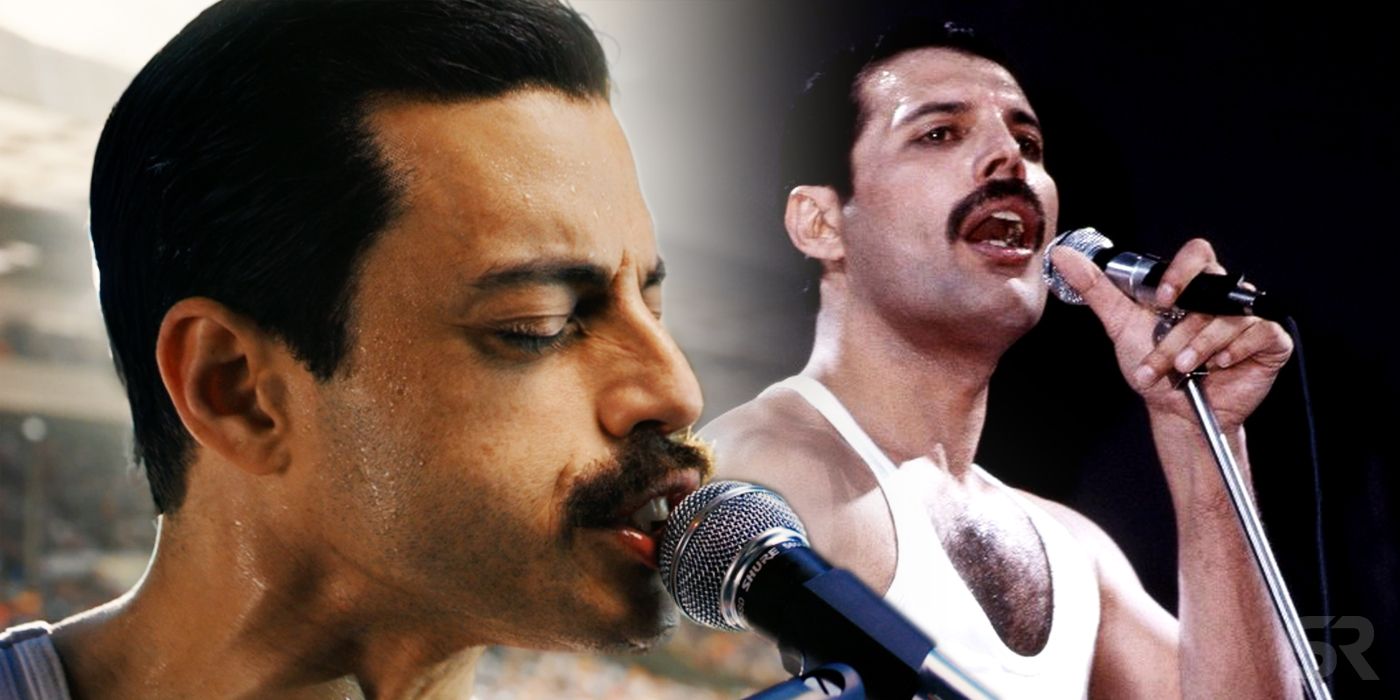
Bohemian Rhapsody charts the true story of Freddie Mercury and Queen’s rise to fame and fortune. However, the film isn’t entirely accurate in its retelling of the band’s history.
Aside from Freddie’s witty barbs – and some sarcastic interplay between the band – Bohemian Rhapsody takes its subjects rather seriously. Starring Rami Malek as Freddie Mercury and Gwilym Lee as Brian May, the movie shows Queen crafting their iconic hits and their eventual triumph at 1985’s Live Aid concert. Yet Queen aficionados are sure to notice that timelines have been tampered with and that occasionally some details don’t add up.
Related: Every Queen Song In Bohemian Rhapsody
This is to be expected somewhat. From Argo to BlacKkKlansman, Hollywood has a long track record of sensationalizing real events for big screen biopics. Yet this isn’t always done to heighten the fictionalized dramatic stakes. Some milestones have to be condensed to fit into that two-hour time frame, or they can’t be portrayed due to rights or permissions being withheld.
In the case of Bohemian Rhapsody, several events are rearranged to create a potent dramatic effect. This approach is most notable towards the end of the film, as the Live Aid concert looms. As many reviews have noted, the result is an occasionally spectacular – if sanitized – celebration of Queen’s history, which shows off the band at their very best.
- This Page: Bohemian Rhapsody Changed Queen & Freddie Mercury's Background
- Page 2: Bohemian Rhapsody Invents Fake Queen Drama
- Page 3: Bohemian Rhapsody's Ending & Reframing Freddie Mercury's Death
Bohemian Rhapsody Changes Almost Everything About Queen's Formation
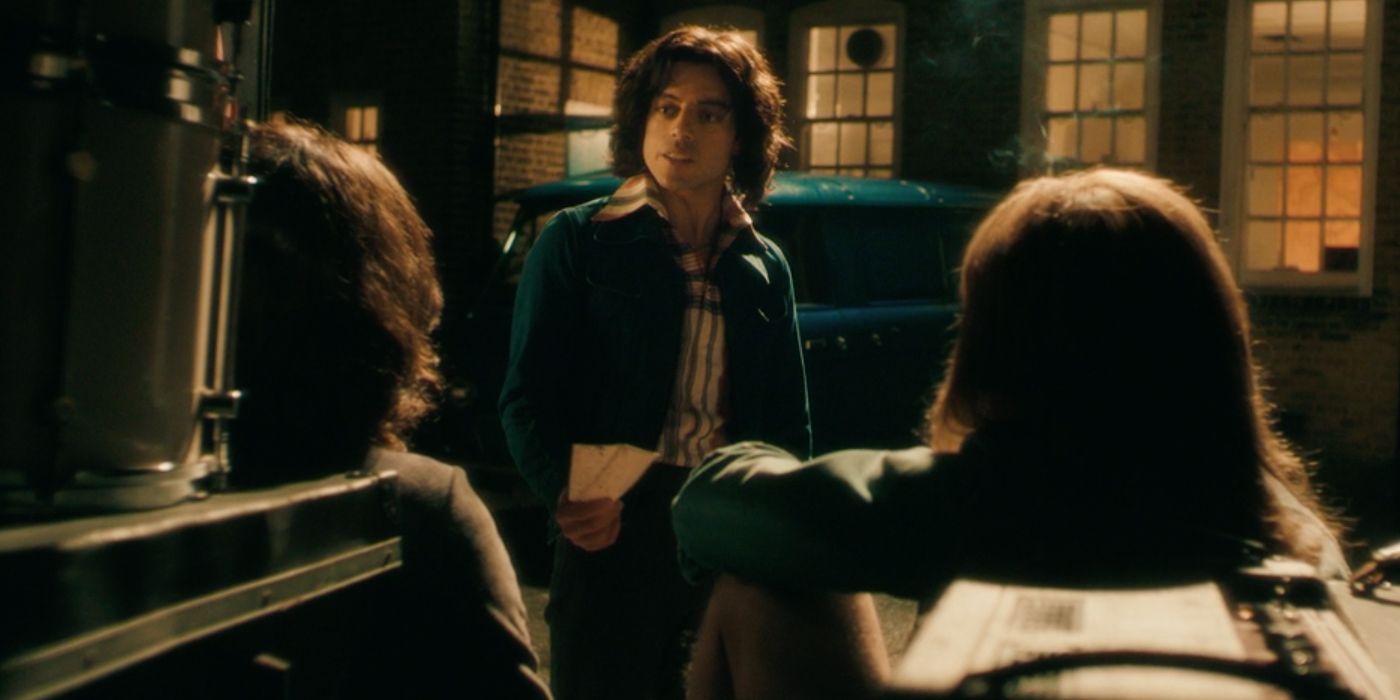
Bohemian Rhapsody's first act details how Queen emerged from their humble beginnings and crafted some of rock music’s most popular songs. It is true that these eclectic personalities – a dentist, astrophysicist, electrical engineer and Parsi immigrant – came to form Queen. But Bohemian Rhapsody does switch up the way in which they all met up.
Following a glimpse at Queen’s Live Aid glory, Bohemian Rhapsody flashes back to Freddie Mercury’s days as a college student and baggage handler at Heathrow Airport. Soon after, the young and shy Farrokh Bulsara heads out to watch the band Smile perform. When bassist Tim Staffell quits at the end of the show, Bulsara plucks up the courage and meets with guitarist Brian May and drummer Roger Taylor. He soon impresses them with his talent, and Freddie is readily accepted as their new lead vocalist.
Far from being that shy youth onscreen, Freddie was always "supremely confident," according to Brian May. According to several sources, it seems that the young Freddie Mercury always believed that he was always going to be a star. Indeed, he’d already been part of a group called Ibex, prior to his partnering with Queen. Plus, he was not unknown to the band at that point; Freddie shared a flat with May, Taylor and Staffell for a time, and they even joined Freddie and Ibex for their encore in Liverpool, in 1969. As such, Freddie’s replacing of Staffell was not as spontaneous at the movie suggests.
Bohemian Rhapsody Cuts Much Of Mary Austin Out Of Freddie's Life
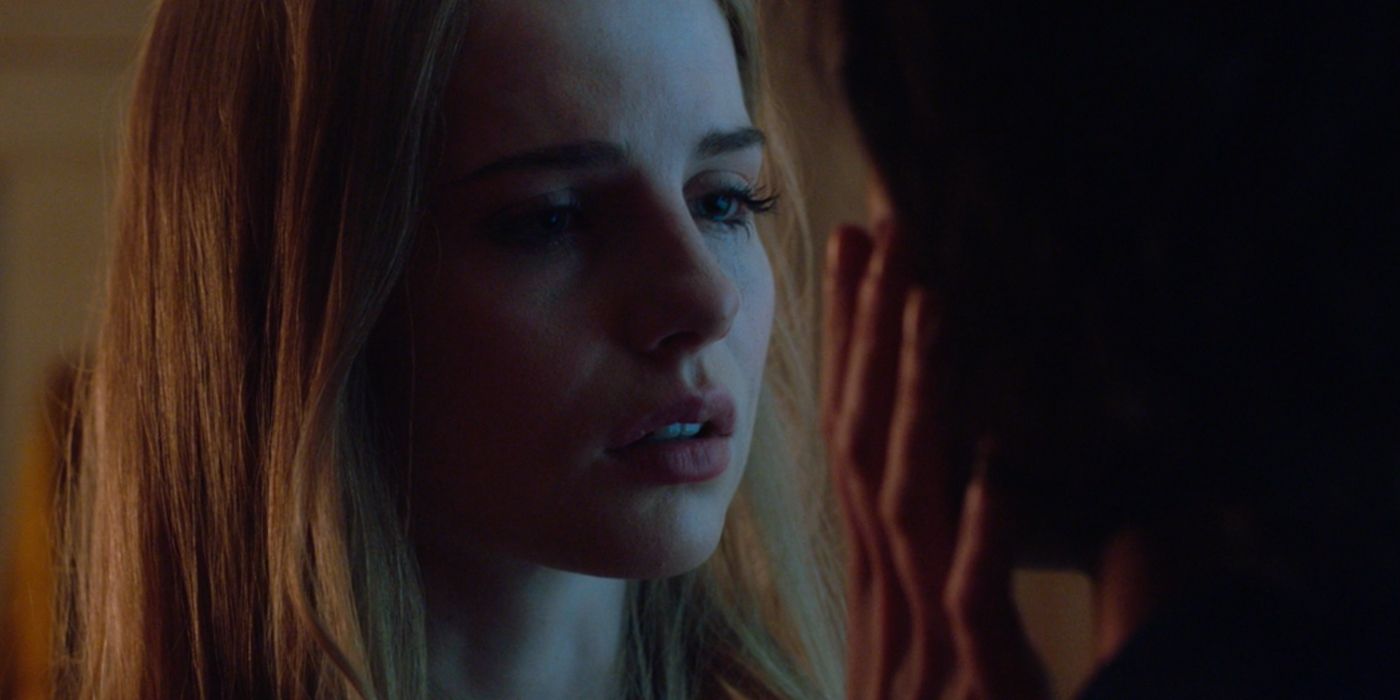
That first Smile gig is a somewhat fateful evening for Freddie Mercury in Bohemian Rhapsody. Prior to joining the band that will become Queen, young Freddie also bumps into a young Mary Austin (Lucy Boynton) with whom he immediately connects with. Soon after Freddie visits her in Biba, the shop where she works, and their connection evolves from there.
Freddie and Mary Austin’s long and abiding love for each other is portrayed in a generally faithful manner in Bohemian Rhapsody. However, their movie counterparts experience things a little differently than reality. In fact, Brian May revealed (via Yahoo) that he’d been dating Austin before Freddie first met her in the shop. After she caught his eye, Freddie sought May’s permission before asking her out, and she only began to follow Smile (soon to be Queen) later on.
Its similarly true that Freddie proposed to her, and that they remained close during their relationships with other people and throughout the entirety of Queen’s ascension. In real life, she even served as his personal assistant for a time. Moreover, Freddie stated that she was “impossible to replace,” and Mary expressed similar sentiments about Queen’s lead singer to Refinery29:
“We'd done it for better for worse, for richer for poorer, in sickness and in health. You could never have let go of Freddie unless he died — and even then it was difficult."
This enduring loving bond slightly contrasts with Bryan Singer’s film, which depicts a rift developing after Freddie’s partying escalates. Given what is known about this unique pair, there’s little evidence to suggest that this was the case.
Freddie Mercury's Sexuality Gets Downplayed In Bohemian Rhapsody
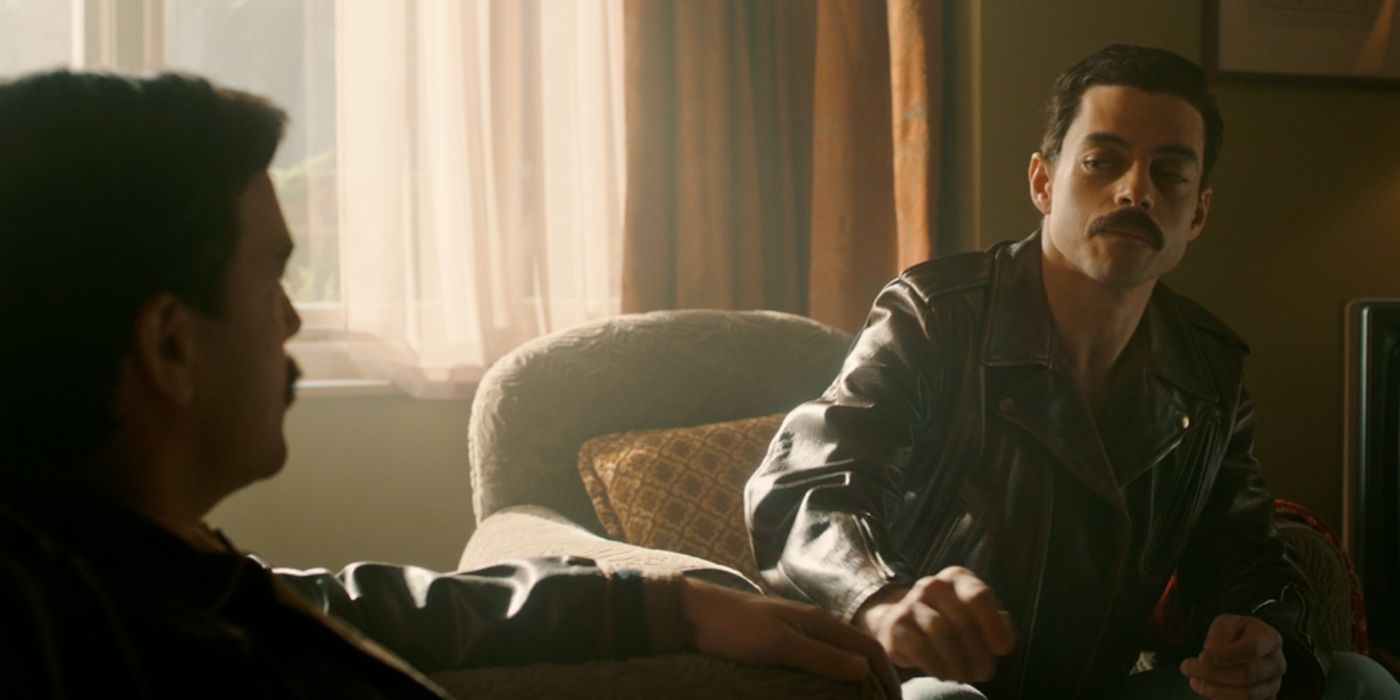
Queen might be known as legends for their music, but Freddie Mercury was also known for his partying, and his substantial sexual appetite. Yet Bohemian Rhapsody refuses to showcase this, aside from the occasional glimpse of white powder and the odd scene of Freddie in a club. This is due to producer Graham King (via THR) wanting to keep the film as family-friendly as possible, so that more tickets can be sold to more demographics.
It’s an understandable business move. However, for a film about Queen, it’s an odd decision, since sexuality – especially homosexuality – is so key to the essence of the band. Moreover, this line of thought brings us to one of Bohemian Rhapsody’s standout sequences: Freddie’s coming out to Mary. Malek’s Freddie asserts that he thinks he is bisexual. Mary responds by stating that he is gay. On the one hand, Bohemian Rhapsody does win accuracy points for replicating this scene almost word for word. But on the other, by failing to depict Freddie’s hedonism, the film creates other problems for itself.
After this scene, Bohemian Rhapsody only depicts Freddie with same-sex partners, such as Paul Prenter (Allen Leech) and Jim Hutton (Aaron McCusker). The movie never challenges Mary’s assertion – both fictional and real – that he was only truly interested in men. It’s a crucial point, because Freddie refused to label himself throughout his life. Certainly, whilst he saw many men after confiding in Mary, there’s plenty of evidence to say that Freddie remained interested in women as well. Indeed, German actress Barbara Valentin was notably one of Mercury’s numerous female lovers.
Some may believe that this isn’t such an important point to make. But by not clearly distinguishing his orientation, the film does do Freddie a disservice. Similarly, whilst he was close with his parents, Freddie never came out to them, nor revealed that Jim Hutton was his partner. When asked, Freddie told them that Hutton was his gardener!
Page 2 of 3: Bohemian Rhapsody Invents Fake Queen Drama
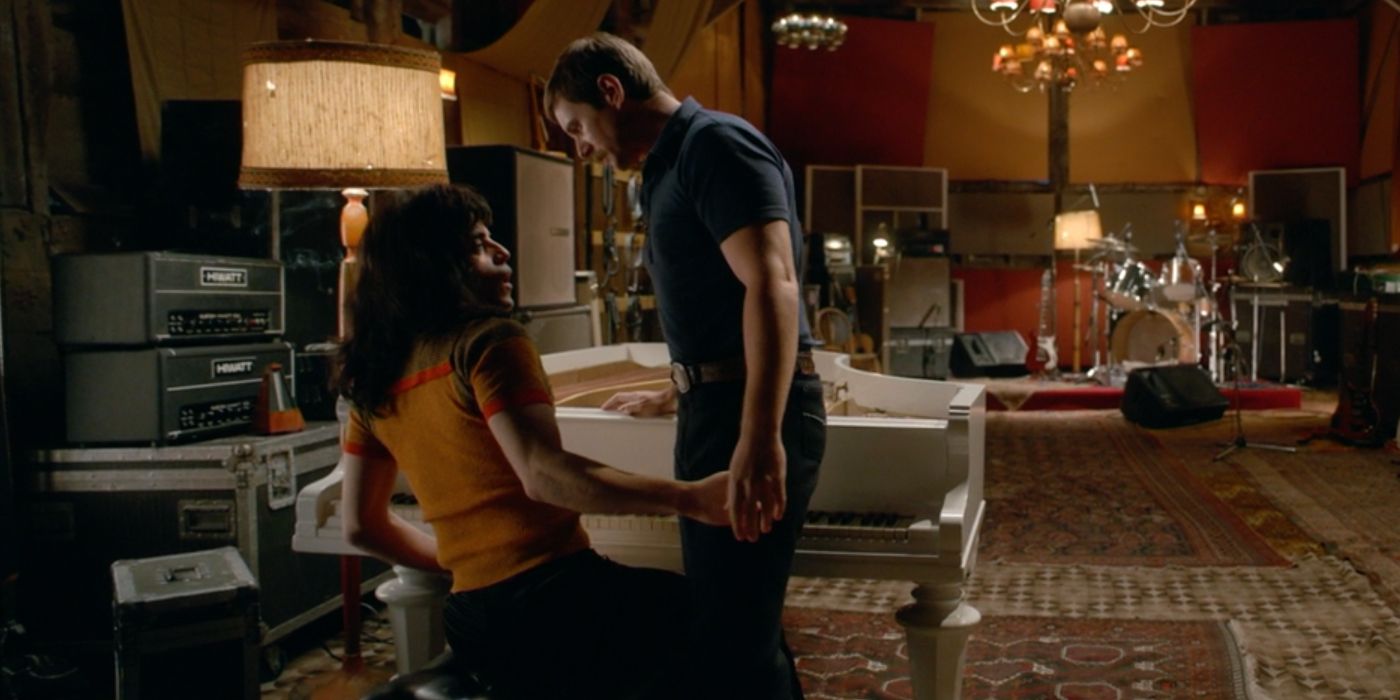
Paul Prenter Was A "Bad Influence" (But Queen Didn't Really Break Up)
Queen, their management, and their loved ones are mostly portrayed as nice, rounded people in Bohemian Rhapsody. The same cannot be said for Paul Prenter, however. Scheming and manipulative, Prenter first appears as their assistant manager, who soon becomes infatuated with Freddie Mercury. He soon begins to control access to Freddie, and convinces the singer to break up Queen so that he can forge a solo career. Bohemian Rhapsody soon shows him isolating an increasingly ill Freddie in Munich, where he takes advantage of the singer’s fame and fortune to host parties. Prenter soon gets his comeuppance though; when Freddie discovers that Paul didn’t tell him about Live Aid, he’s fired.
In contrast to many of Bohemian Rhapsody’s other plot points, much of this did seem to happen. Surviving Queen members said that they frequently disagreed with Prenter’s decisions for the band. These included the disco-influenced content their album Hot Space, which is still seen as one of their weaker entries. Due to the way in which he subtly controlled Freddie Mercury, May and Taylor have since referred to him as a nasty, "bad influence".
Even so, Prenter was not the sole focal point of Queen’s ills. Certainly, it transpires that Freddie was not the only member of Queen to travel to Munich. The band accompanied Freddie to Germany, though this was a similarly dark time and place for them as well. Additionally, Prenter’s machinations did not result in Queen’s break up. In fact, Queen didn’t even break up. They amicably decided to decrease their output and focus upon their solo careers.
Furthermore, Bohemian Rhapsody changes the grounds for Prenter’s dismissal. Freddie didn’t fire him until 1986, a year after their Live Aid performance. And whilst, as Bohemian Rhapsody shows, Prenter betrays Freddie in a very public fashion, Paul did not divulge his personal details on a TV interview. Instead, he was rewarded handsomely for leaking information to British tabloid The Sun.
Mike Myers' Manager Was Made Up
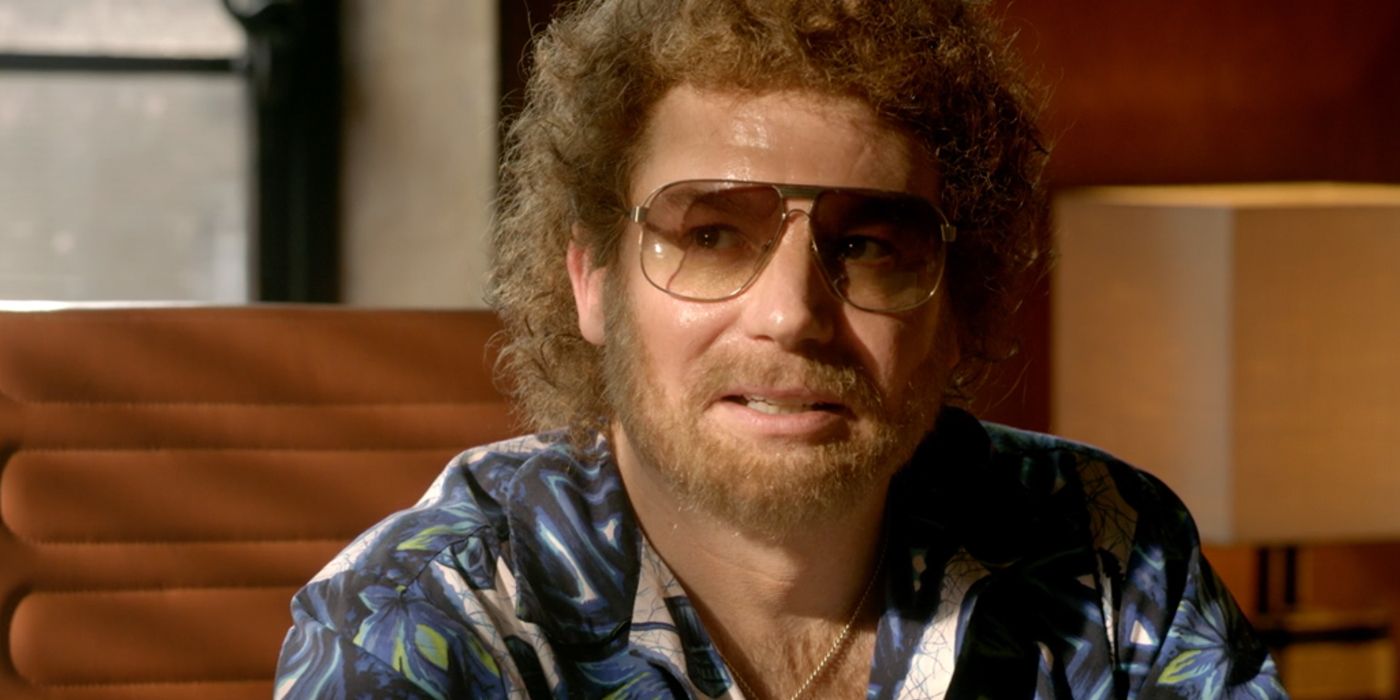
Game of Thrones’ Littlefinger, Aiden Gillen, is a reliable presence in Bohemian Rhapsody. He’s Queen’s supportive manager, John Reid, who steers the band to glory in their early years. Reid subsequently orchestrates and accompanies them on their Stateside tour in the early 1980s.
But Paul Prenter has a plan up his sleeve. He informs John that he’s received a large offer for Freddie to go solo, and that he should be the one to discuss it with the star. Knowing full well that Freddie won’t want to be disloyal to his bandmates, he sets John up to fall, and his scheme is rewarded. A furious Freddie ejects John from the car and severs ties with him immediately. Subsequently, Paul swiftly begins to fill the power vacuum.
History differs somewhat from Bohemian Rhapsody’s rather dramatic account of their parting. John Reid actually split from Queen in 1977, and it was far from the rage-fuelled split that we see on screen. Queen’s lawyer and manager Jim Beach has been quoted as saying that they always "had a good working relationship with John," and it appears that Reid and Queen parted on good terms.
By this point in the movie however, John Reid isn’t the first man to manage the unruly rock band. Ray Foster (played by Mike Myers) assumes that role in Queen’s early days. He’s an overbearing executive at the EMI record label, who loves formulas yet hates Bohemian Rhapsody. Several sites have already confirmed that Ray Foster never existed, and that Myers’s character is a composite of various officials who were less than keen on Queen’s titular masterpiece. One of these was Paul Watts, who later recalled:
“I was expecting something very special. So when they played me Bohemian Rhapsody, my reaction was, ‘What the fuck’s this? Are you mad?’”
As time - and the movie - have shown, driving teenagers would in fact rock out to this timeless tune for years to come.
Page 3 of 3: Bohemian Rhapsody's Ending & Reframing Freddie Mercury's Death
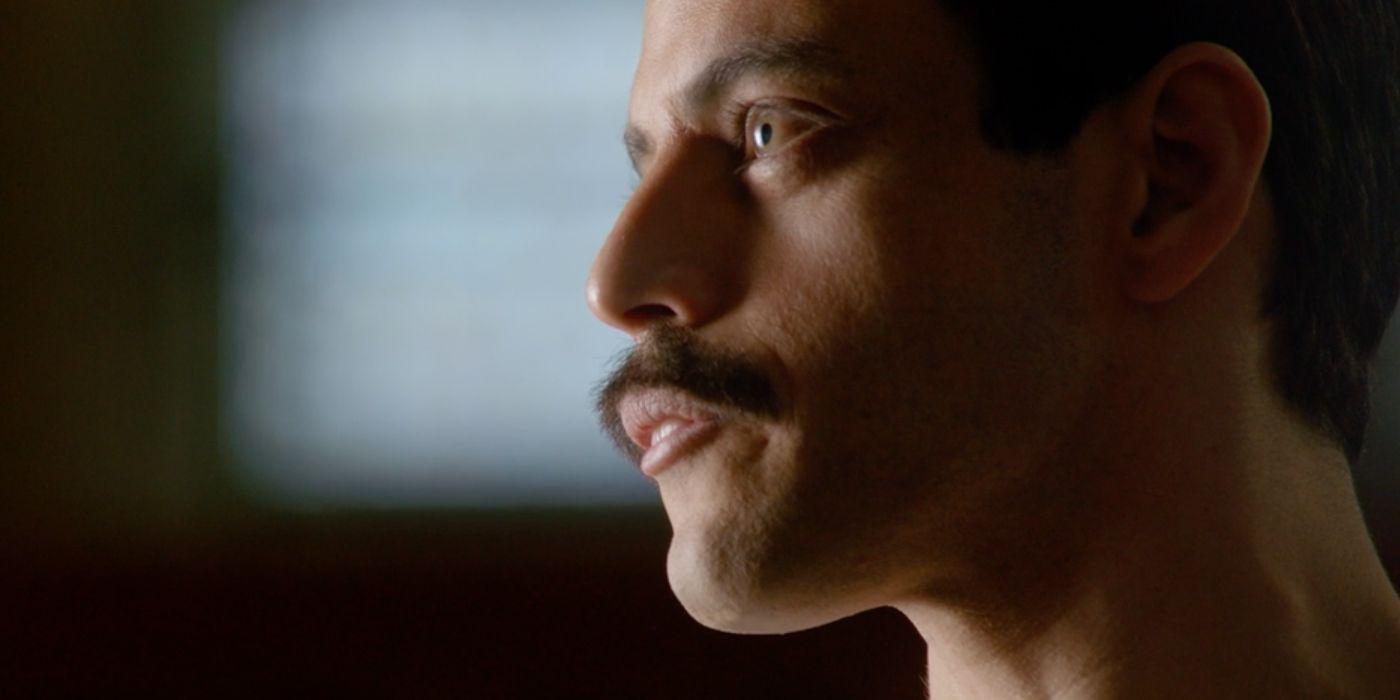
Bohemian Rhapsody Changes The Timeline Of Freddie’s Battle With HIV
In Bohemian Rhapsody, Live Aid is a hugely important time in Freddie’s life. Not only does he start a relationship with Jim Hutton and come out to his parents, he discovers that he has HIV. Freddie soon discloses this to his band-mates, and they decide to give their all in the upcoming concert.
Whilst rumors that Freddie was ill were circulating in the tabloids of that year, he wasn’t actually diagnosed with the virus until 1987. Furthermore, he didn’t immediately make Queen aware of his condition. Though they had suspected he was ill, it took Freddie at least two years to inform them, and only went public with the news in November 1991.
Additionally, many viewers have assumed that one of Queen’s most soulful hits, “Who Wants To Live Forever”, was written in response to Freddie’s affliction. After all, Bryan Singer chooses to play this song in the moments where Freddie comes to terms with the deadly illness. In actuality, Brian May composed the song for Highlander, a cult film that depicts battling immortal warriors. Moreover, the heartfelt, wistful Queen song plays as the death-defying protagonist, Connor MacLeod, watches his wife succumb to old age. This movie wasn’t released until a year after Live Aid, and a year before Freddie was diagnosed with HIV.
Queen Were Legendary At Live Aid – But Didn't Save It
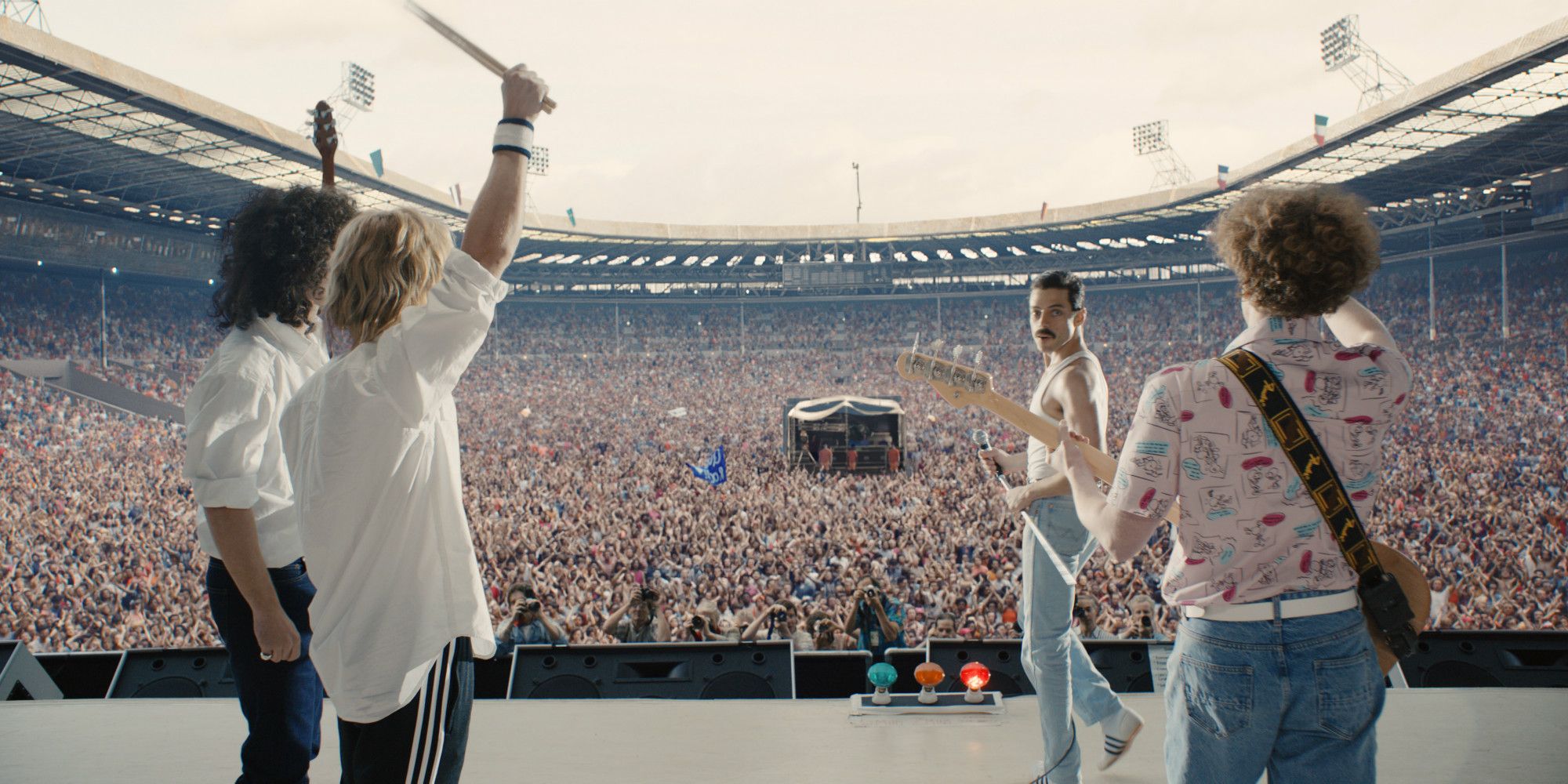
The Live Aid section of Bohemian Rhapsody is a scintillating, crowd-pleasing triumph. With Rami Malek channeling the outrageous energy of Queen’s beloved singer, it’s a powerful and visceral way to experience their music. Certainly, given how relations between Freddie and the band had progressed – in the film at least – it appears that it pulled Queen back from the brink.
Most of the hype that is bestowed upon Queen’s Live Aid performance in the film is undoubtedly warranted. Their set is still ranked as one of the best live shows of all time. Shortly after they had performed, Elton John even lamented that they had stolen the show. However, it wasn’t quite the last-ditch attempt at unification that it’s made out to be.
Sure, Queen was not at their strongest in the run-up to Live Aid. Their output had slowed somewhat, although they continued to tour throughout 1984 and 1985. In turn, they faced a massive backlash for breaking a United Nations-sanctioned boycott and playing gigs in apartheid South Africa. Nevertheless, by the time that Live Aid came around, they were still a functioning musical group.
Plus Bohemian Rhapsody shows scenes where no one is donating to the cause until Freddie Mercury took to the mic. Considering that many contemporary superstars (such as David Bowie, Elton John, Paul McCartney and many more) were playing at the event, its highly doubtful that this was the case. As such, the shots of Bob Geldof (Dermot Murphy) watching in relief and gratitude as the money piles up is a touch of exaggerated artistic licence which rather oversells the moment.
What Happened After The End?
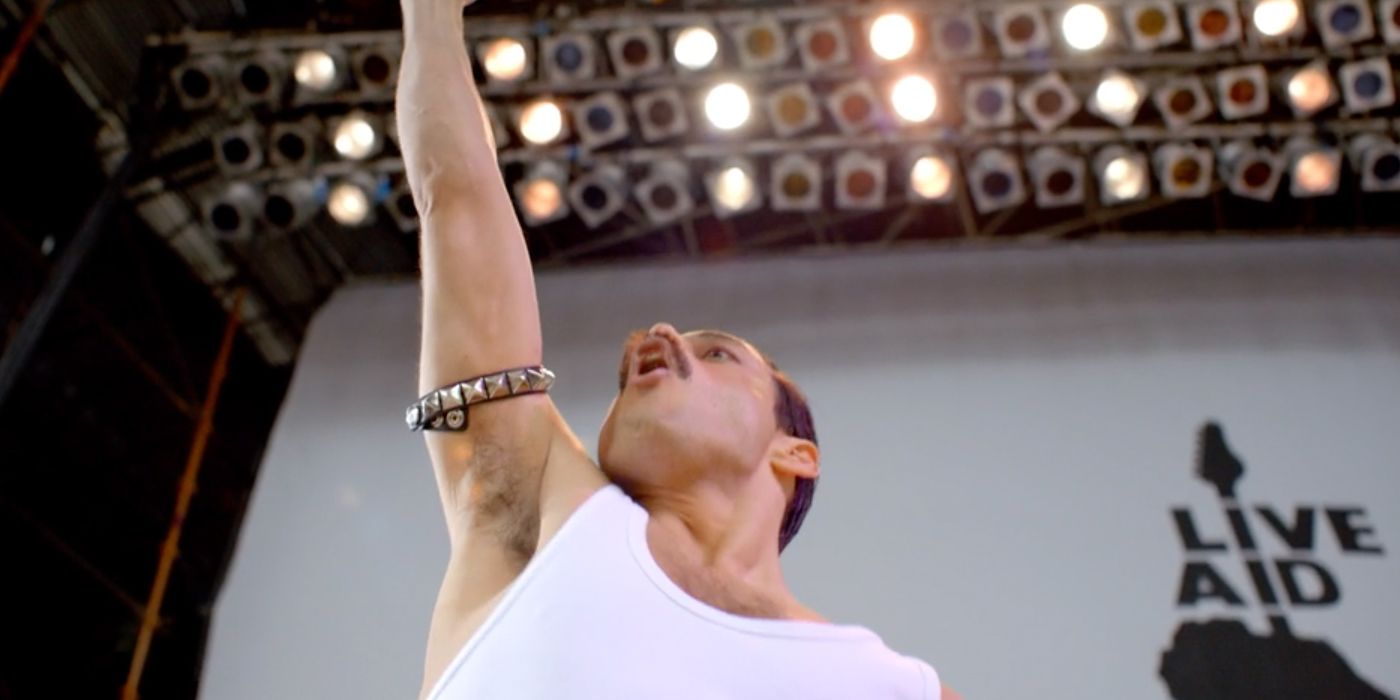
Bryan Singer's biopic of Queen closes with lingering shots of Live Aid 1985. Although in real life, this was not the end for Queen. They still continued to make critically acclaimed songs until mere weeks before Freddie passed away in 1991. During that six years, Freddie and Jim Hutton remained together, despite Hutton being diagnosed with HIV as well. Hutton passed away in 2010. Mary Austin still lives in Freddie's mansion, which he bequeathed to her in his will.
But what of the remaining Queen members? Well, as the last title cards revealed, they formed the Mercury Phoenix Trust to tackle AIDS worldwide. Aside from several concerts through the 1990s - which included the Bejart Ballet in Paris in 1997 - John Deacon has since retired from music altogether.
Yet that hasn’t stopped Brian May and Roger Taylor from continuing their legacy. Since Deacon quit, they have toured with Paul Rogers as their lead vocalist between 2004 and 2009. When they subsequently parted ways, American singer Adam Lambert was recruited to form Queen + Adam Lambert. The new group is still touring to this day and they have teased that they might record new music together soon.
-
Musical historians and Queen fans may baulk at Bohemian Rhapsody’s frequent muddling of their song releases, and its occasional deviance's from their history. Nonetheless, audiences may get a sense of what the band was like in their heyday and be reminded of how heavily Queen have influenced modern music. There’s an argument to be made that Bohemian Rhapsody fails to give its iconic lead singer the attention and depth he deserves. Yet as it stands, you’d be hard pressed to find any movie that exhibits the power of Queen’s marvellous music as well as Bohemian Rhapsody does.
Next: The Most Brutal Reviews of Bohemian Rhapsody
from ScreenRant - Feed https://ift.tt/2qnVFds

0 Comments